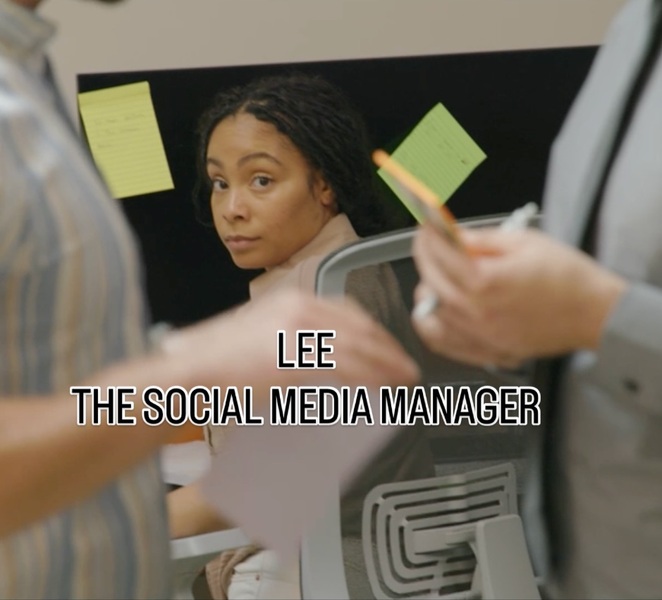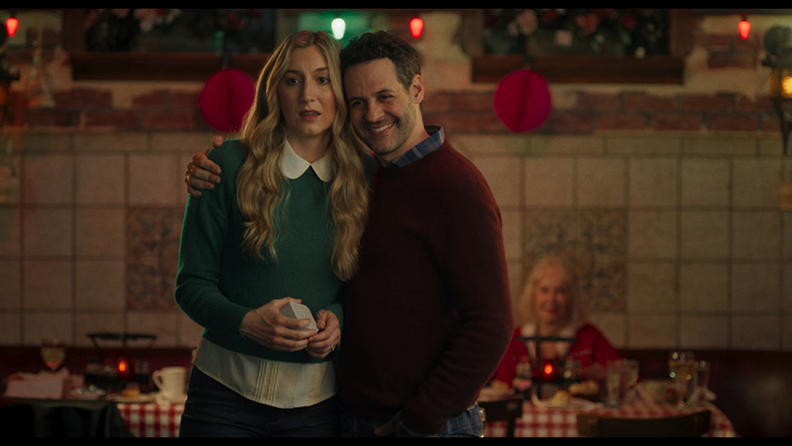
A Desk, a Disaster, and a Thousand Emails
MOVIE REVIEW
Werk
–
Genre: Mockumentary, Workplace Comedy
Year Released: 2025
Runtime: 10 x ~12m episodes
Director(s): Ruby Lee Dove
Writer(s): Ruby Lee Dove
Cast: Ruby Lee Dove, Adam Chisnall, Graciela Cuevas, Sean Buckingham Jr., Sabrina Orro
Where to Watch: screen the first nine episodes here now, with the final episode premiering October 19, 2025, at noon PST here: www.youtube.com
RAVING REVIEW: WERK treats the modern marketing agency like a pressure cooker disguised as a break room. Shot with the looseness of a doc crew embedded among “creatives,” the series leans into the chaos that happens when deadlines, egos, client briefs, and clashing generations try to share the same room. The hook is simple: a small crew follows The Digital Creative Group across meetings, mishaps, and minor revolutions. The pleasure comes from how quickly the veneer of office shine scrapes away and how precisely this team’s shared illusion of control collapses under the camera’s attention.
The mockumentary format is not a shortcut here; it’s a design choice that keeps the jokes accountable. Instead of punchlines built in a writer’s room void, humor lands as cause-and-effect—someone overpromises, someone underprepares, someone tries to clean O’Shea’s desk like it’s an archaeological site, and the rest of the episode becomes a scramble to disguise the ripple. Ruby Lee Dove’s approach favors behavioral comedy over zingers. You can feel it in the cutaways that linger half a second too long, catching the awkward silence after a performative pep talk, or the smirk that betrays a co-worker’s true feelings. That small, observational specificity is the show’s secret engine.
There’s an authenticity to how WERK understands “creative” workplaces in 2025. Titles are vague, roles spill into each other, and “strategy” is code for “we’ll figure it out by the presentation.” Younger employees carry the burden of competence while older legacy workers have the burden of precedent; both resent the other’s blind spots. This dynamic plays out most clearly in the collisions between Mi’kael’s managerial style and the team’s unspoken consensus that results matter more than rhetoric. It also shows up in Lee’s ongoing duel with Napoleon, a conflict that reads like a case study in ambition, insecurity, and the unwritten rules of who gets to take up space. The series resists turning any of these people into villains. Even the shadiest moves are framed as survival tactics in a system that rewards appearances as much as outcomes.
O’Shea is the show’s most perceptive bit of character design. His desk—a running visual gag that doubles as a personality map—serves as WERK's anchor image: the mind of a talented person who never learned to translate logic into a shared process. He’s not incompetent; he’s a one-person filing system that only he understands, and it’s both endearing and disastrous. When Anna tries to intervene, the scene doesn’t just set up a joke; it exposes a real fault line between people who need order to function and people who thrive inside a storm. That line is where many offices live now, and the show mines it without sermonizing.
WERK also nails the swing between mockery and sting. Episode descriptions hint at “Werk War” and escalating tension, but the series keeps the comedy rooted in plausible decisions. Even when behavior crosses a line, the fallout feels earned because we’ve watched the tiny compromises that made it possible. This is where the show’s empathy pays off. It’s easy to parody offices; it’s harder to show how decent people end up doing questionable things under pressure while still making that progression funny. WERK threads that needle by letting characters argue with themselves as often as they argue with each other.
There’s an undercurrent of creative-class precarity beneath the jokes. The influencer economy wanders through the office like weather—opportunity if you catch it, distraction if you don’t. Clients behave like plot twists, re-prioritizing weeks of work with a single comment. In that environment, “respect” becomes a currency as important as salary, which is why Mi’kael’s bid for authority and the team’s calibration of trust matter so much. The series understands that modern offices run on stories—what we tell clients about ourselves, what we tell ourselves about our value—and it’s interested in what happens when those stories stop matching the footage.
Ruby Lee Dove’s own story—non-traditional path, parenthood, service, persistence—quietly informs the series’ moral center. You can feel the respect for grind. The episodes aren’t cynical about work; they’re clear-eyed about the gap between the job we imagine and the job we can do on a Tuesday afternoon with a camera pointed at us. That respect unlocks a final, welcome quality: warmth. Even at its most chaotic, WERK cares about the people in its frame. It laughs at them, sure, but it also gives them space to change their minds, to apologize, to try again. In the current age of scorched-earth office satire, that’s a refreshing bet.
As a package, WERK is a nimble, observed first season in progress—funny without flippancy, specific without inside bloat, and ambitious without overreaching its production reality. Fingers crossed that episodes 9 and 10 deliver on the trajectories already in motion. In that case, this will end its run as an honest, entertaining snapshot of how “creative” actually looks when the camera won’t stop rolling. There is no question that another iconic series inspired this one, but it feels like the homage it deserves, even more so than the actual sequel series it received.
Please visit https://linktr.ee/overlyhonestr for more reviews.
You can follow me on Letterboxd, Instagram, Twitter, and YouTube. My social media accounts can also be found on most platforms by searching for 'Overly Honest Reviews'.
I’m always happy to hear from my readers; please don't hesitate to say hello or send me any questions about movies.
[photo courtesy of TRIBERU MEDIA, A RUBY DOVE PRODUCTION]
DISCLAIMER:
At Overly Honest Movie Reviews, we value honesty and transparency. Occasionally, we receive complimentary items for review, including DVDs, Blu-rays, CDs, Vinyl Records, Books, and more. We assure you that these arrangements do not influence our reviews, as we are committed to providing unbiased and sincere evaluations. We aim to help you make informed entertainment choices regardless of our relationship with distributors or producers.
Amazon Affiliate Links:
Additionally, this site contains Amazon affiliate links. If you purchase through these links, we may receive a commission. This affiliate arrangement does not affect our commitment to honest reviews and helps support our site. We appreciate your trust and support in navigating these links.



Average Rating